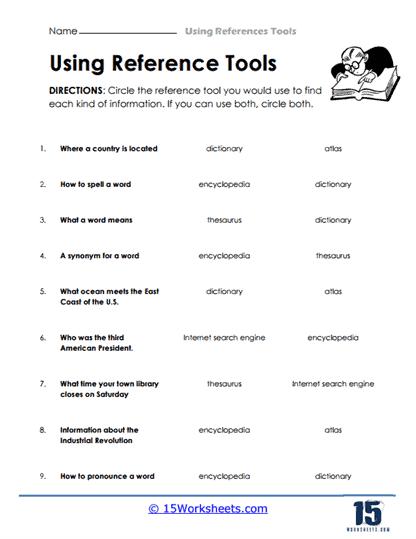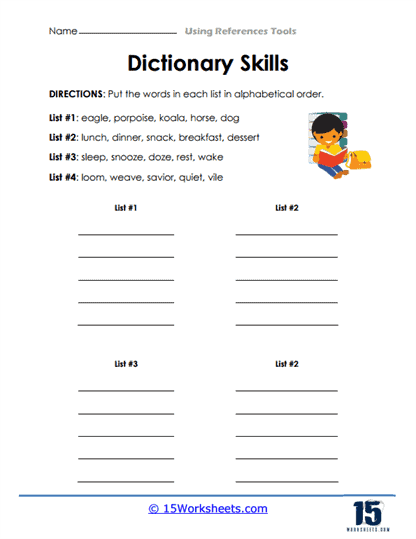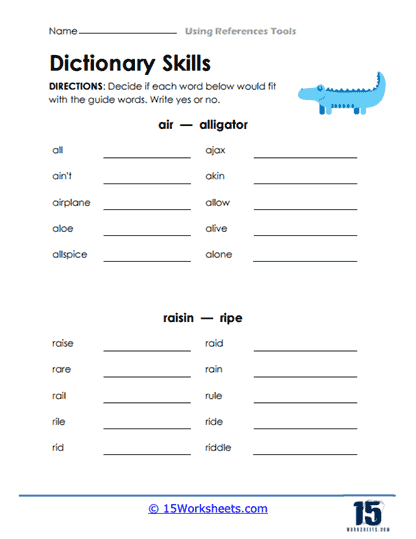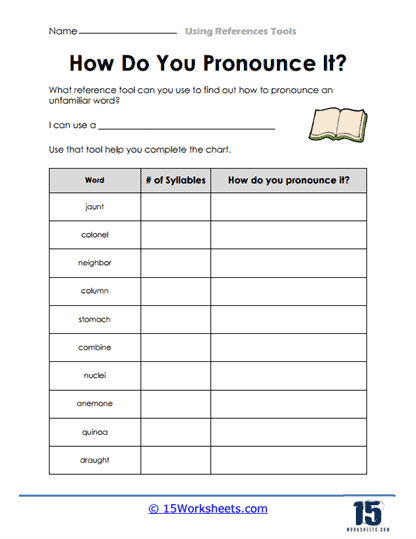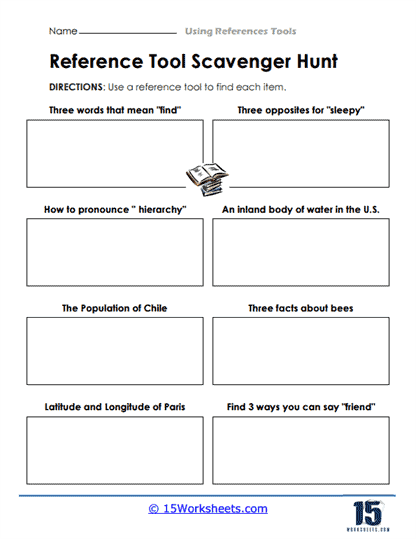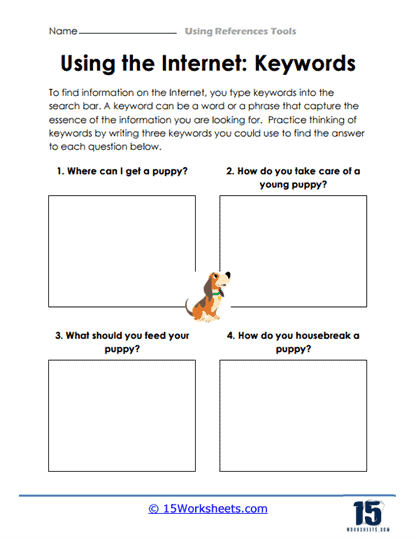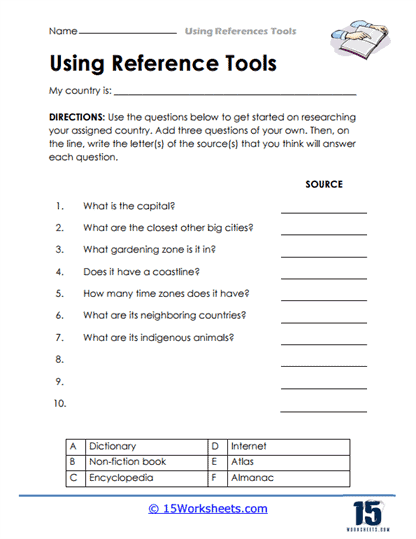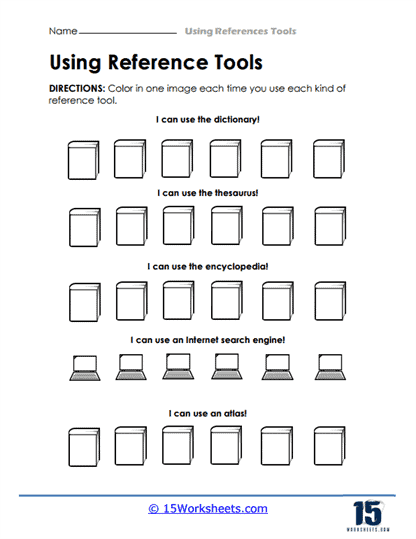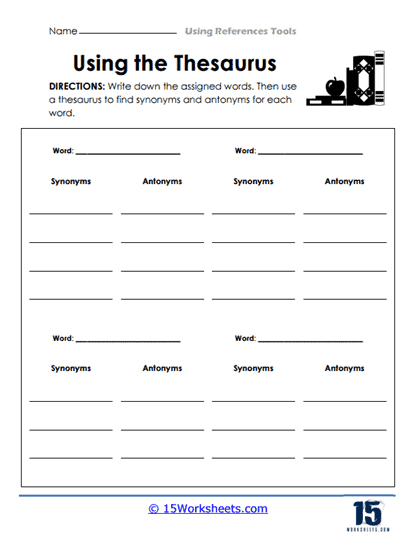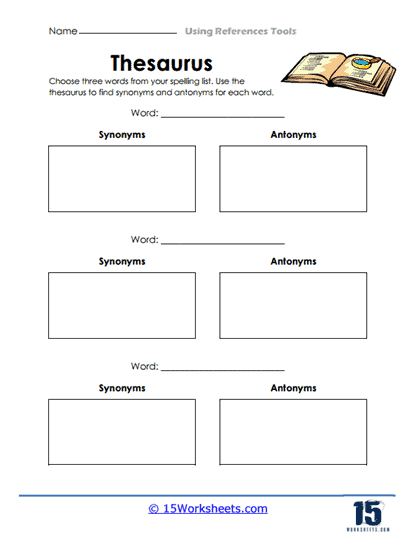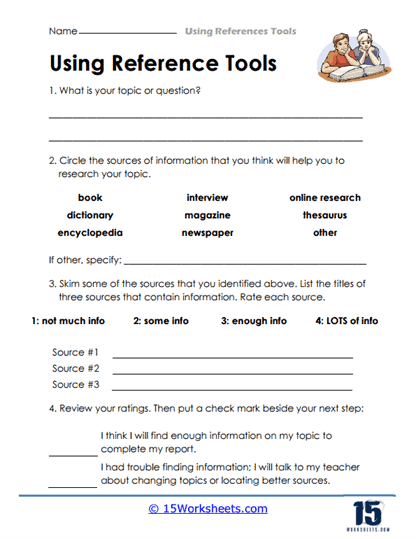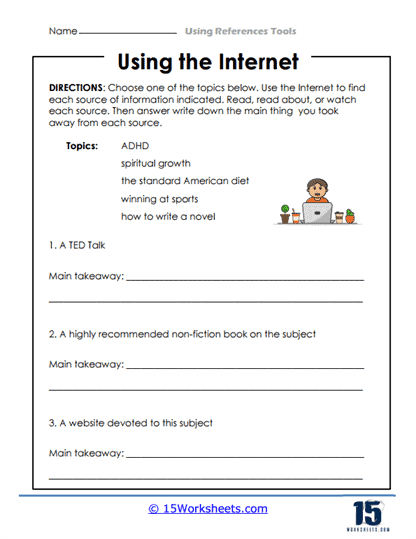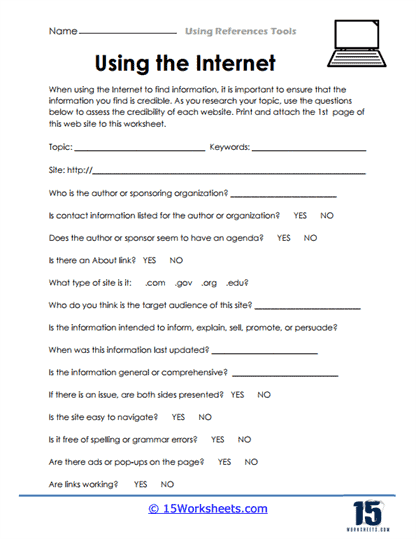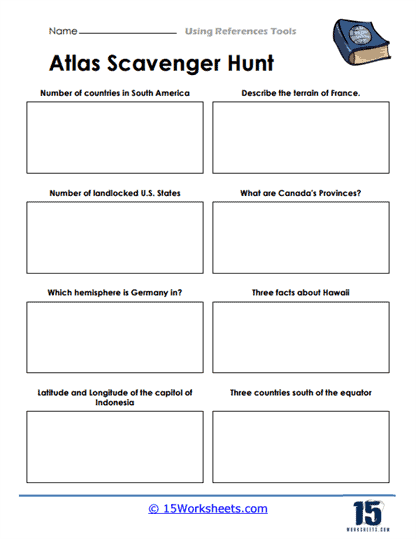Reference Tools Worksheets
All About These 15 Worksheets
This series of 15 worksheets on Reference Tools is designed to equip students with the skills and knowledge to effectively utilize a variety of reference materials. These worksheets cover a wide range of topics related to reference tools, including dictionaries, thesauruses, atlases, online resources, and more. By engaging with these worksheets, students can enhance their research skills, develop vocabulary-building abilities, and learn how to access accurate and reliable information from various sources. Whether it’s exploring reference books or utilizing online databases, these worksheets provide practical guidance to help students become confident and resourceful researchers. Through these worksheets, students will:
- Be familiar with the various types of resources available to them and appreciate the benefits of using reference tools for academic research and learning;
- Effectively use dictionaries to look up word definitions, part-of-speech information, synonyms, antonyms, and examples of word usage;
- Learn and practice the correct pronunciation of words using reference tools;
- Become familiar with the structure and organization of various resources while honing their research and information retrieval skills;
- Formulate search queries, evaluate search results, and refine their searches to find reliable and relevant information on the internet;
- Understand the criteria for selecting the most appropriate reference tool based on their information needs;
- Be introduced to the use of the thesaurus, a valuable tool for expanding vocabulary and finding alternative words;
- And enhance their map-reading skills and their understanding of global geography through the use of the Atlas.
This series of worksheets on Reference Tools offers students a comprehensive set of resources to enhance their research skills and information retrieval abilities. By engaging with these worksheets, they can develop their vocabulary, hone their critical thinking skills, and become adept at using a variety of reference tools to access accurate and reliable information. Overall, these worksheets provide practical guidance and interactive activities to empower students in their research and promote lifelong learning skills.
What Are Reference Tools?
Reference tools are resources that provide information, facts, definitions, explanations, or context on a variety of subjects. They are designed to assist in research, learning, problem-solving, or decision-making. Reference tools can be found in various formats, including print, digital, and online resources. Some common types of reference tools include:
Dictionaries
These provide definitions, pronunciations, etymologies, and sometimes usage examples for words in a particular language. There are also specialized dictionaries that focus on specific fields, such as medical, legal, or technical terms.
Encyclopedias
Encyclopedias offer comprehensive overviews and background information on a wide range of subjects, typically in an alphabetical format. They can be general, covering many topics, or specialized, focusing on a specific field or subject area.
Thesauri
Thesauri are tools that list synonyms, antonyms, and related words, helping users find the right word or phrase to convey their intended meaning.
Atlases
Atlases contain maps and geographical information, covering various regions or the entire world. They can provide political, physical, historical, or thematic information, depending on their focus.
Almanacs
Almanacs are annual publications that provide a wealth of information, such as statistics, facts, and data on various topics, including weather, astronomy, history, economics, and sports.
Handbooks and Manuals
These reference tools provide detailed instructions, guidelines, or procedures for specific tasks, techniques, or areas of knowledge. They can be general, such as a computer user manual, or specific to a particular discipline, such as a photography handbook.
Bibliographies
Bibliographies are lists of sources (books, articles, websites, etc.) on a specific topic or by a particular author, helping users find relevant materials for research or further reading.
Directories
Directories contain listings of individuals, organizations, or resources, often with contact information and brief descriptions. Examples include telephone directories, professional directories, and website directories.
Citation Guides
Citation guides outline the proper formatting and citation styles for various types of sources (e.g., books, articles, websites) in academic writing. They help users adhere to established guidelines, such as the APA, MLA, or Chicago citation styles.
Reference tools play a crucial role in research, learning, and information gathering, helping users find accurate and reliable information, clarify concepts, and expand their knowledge on various subjects.
How to Improve Your Ability to Use Reference Tools
Improving your ability to use reference tools effectively can enhance your research, learning, and problem-solving skills. Here are some tips to help you become more proficient in using reference tools:
Familiarize Yourself
Learn about various reference tools, such as dictionaries, encyclopedias, thesauri, atlases, almanacs, handbooks, and bibliographies. Understand their purposes and when to use each one.
Practice Regularly
Incorporate reference tools into your daily studies or work. The more you use them, the more comfortable you will become with navigating and extracting information from these resources.
Explore Both Print and Digital Resources
Familiarize yourself with print and digital versions of reference tools, as each format may have unique features and advantages. Online resources often provide additional search capabilities and multimedia content, while print resources can offer a more tactile and focused experience.
Work On Advanced Search Techniques
Improve your search skills by learning advanced search techniques, such as using keywords, Boolean operators, and filters. This will help you locate information more efficiently and effectively within reference tools.
Understand Citation Styles
Learn how to properly cite reference tools in your academic work, following established citation styles like APA, MLA, or Chicago. This will ensure you give proper credit to the sources you use and enhance the credibility of your work.
Attend Workshops or Training Sessions
Many schools, universities, and libraries offer workshops or training sessions on using reference tools and conducting research. Participating in these sessions can help you learn best practices and improve your skills.
Ask for Help
If you are unsure how to use a specific reference tool or locate information, don’t hesitate to ask for help from teachers, librarians, or peers. They can provide guidance, tips, and insights that will improve your ability to use these resources effectively.
Never Stop Learning
Keep yourself informed about new reference tools, updates to existing resources, and emerging technologies in the field of information and research. This will ensure you have access to the most current and relevant information.
By following these tips and practicing regularly, you can enhance your ability to use reference tools effectively and efficiently, ultimately improving your research, learning, and problem-solving skills.

